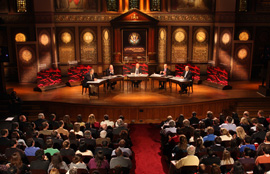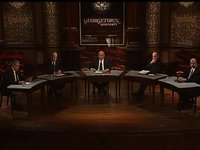This House believes it's time for the US to get tough on Israel
Wednesday March 25 2009
Georgetown University, Washington DC
MOTION PASSED
by 63% to 37%
Details

An often heated Doha Debate at Georgetown University in which a 450-strong mainly student audience voted 63-37 percent in favour of a new "get tough on Israel" policy reflected a sharp mood swing in America, commentators said.
The Doha Debates were invited to travel from Qatar to stage their monthly debate at what is widely regarded as North America's most political university.
Phil Wilcox, a former US ambassador to Israel and fellow of the Washington-based Middle East Institute, said the debate appeared to reflect a general malaise among Americans over the Bush administration's Israel policy.
"It has been evident from recent opinion polls and reactions from the Jewish community, as well as broader public opinion in America, that there is a demand for much stronger leadership from the US government towards Israel.
"While the Jewish community may not actually be calling for a "get tough" policy, it is certainly seeking stronger, more consistent leadership from the administration.
"There is a mythology that a right-wing Jewish establishment has run our policy on Israel for years. This is not only a myth but I think we will see the Obama administration looking at this entire relationship much more carefully," he said.
The Georgetown debate followed a letter sent to the White House in January signed by a collection of seven Jewish, Arab, American and religious organisations calling for President Obama to take the lead in efforts to deliver a solution to the Israeli-Palestinian conflict. It called on the President to make a "fresh start" in efforts to "find solutions, create incentives and implement a plan".
"There's a fresh breeze blowing in Washington when it comes to American policy toward Israel and the Middle East," said Jeremy Ben-Ami, Executive Director of J Street, the Washington-based political arm of the pro-Israel, pro-peace movement.
A recent poll published by J Street found that 86 percent of American Jews approved of the US playing an "active role" in the peace process, while 81 percent would maintain their approval even if both sides were pressurised by Washington.
"American Jews are ready, by a margin of two-to-one, to work with a Palestinian unity government, including Hamas, to achieve a peace agreement with Israel. They overwhelmingly support active American engagement even if it means disagreeing with Israel and the Palestinians publicly," Ben-Ami of J Street said.
During the Doha Debate on March 25th, Chairman Tim Sebastian had to intervene frequently to call for both sides to stop arguing with one another and hurling insults as tempers frayed.
At one point, when no one could be heard properly because of the raised voices, the chairman reminded both sides that similar debates were regularly held in Qatar without descending into chaos.
The motion 'This House believes it's time for the US administration to get tough on Israel' was carried convincingly despite passionately-argued support for the status quo from Dore Gold, a former Israeli ambassador to the UN, and Alan Dershowitz, a prominent Harvard law professor.
The vote came at a time when President Obama's administration is seeking to implement fresh initiatives in the Middle East. It delivered a message to Capitol Hill that America may be ready to ditch decades of virtually unqualified support for Israel.
Arguing in favour of the motion, Michael Scheuer, founder and former head of the CIA's Bin Laden tracking unit, suggested that the present US-Israel relationship undermined national security and Israel should be left to its own devices.
He referred to a "pro-Israel fifth column of US citizens" that "corrupt US politics" and subordinate US interests to those of Israel. That support had turned Israel into the most "arrogant, avaricious and treacherous American ally".
Mr. Scheuer said America should cut all ties with Israel and the Palestinians, leaving both sides to settle their disputes without support or interference from outside on the principle that "no nation has a right to exist and the war's outcome is irrelevant to America".
Supporting him, Avraham Burg, former speaker of the Israeli Knesset and a senior member of the Labour Party spoke of the "cowboy, isolationist, indifferent, arrogant policy" of the Bush administration which had achieved nothing but a stalemate in the region.
Only a "dramatic turnaround" could change the situation. He likened America's attitude to Israel to that of a "bad parent" who never says "no" to their offspring. "If it calls for tougher measures to unlock the locked horns of both sides, then so be it."
Dore Gold, ambassador to the UN between 1997-1999, insisted that it was "myopic" to speak of putting pressure on Israel to force it to change its policies since Israel was not the real problem.
"We and our Arab neighbours have a different perception of the central problem of the Middle East - it is a nuclear Iran, it isn't Israel."
Alan Dershowitz, the Felix Frankfurter Professor of Law at Harvard Law School, said any notion of "getting tougher" on Israel would merely send the wrong signal to Israel's enemies and cause even greater bloodshed in the Middle East. Support for the motion "will cause war not peace".
"We need to be smart with Israel, not tough," he said. As the only democracy in the Middle East "they are tough enough on themselves." It is the countries without democracies "that need pressure - not Israel".
Watch online

